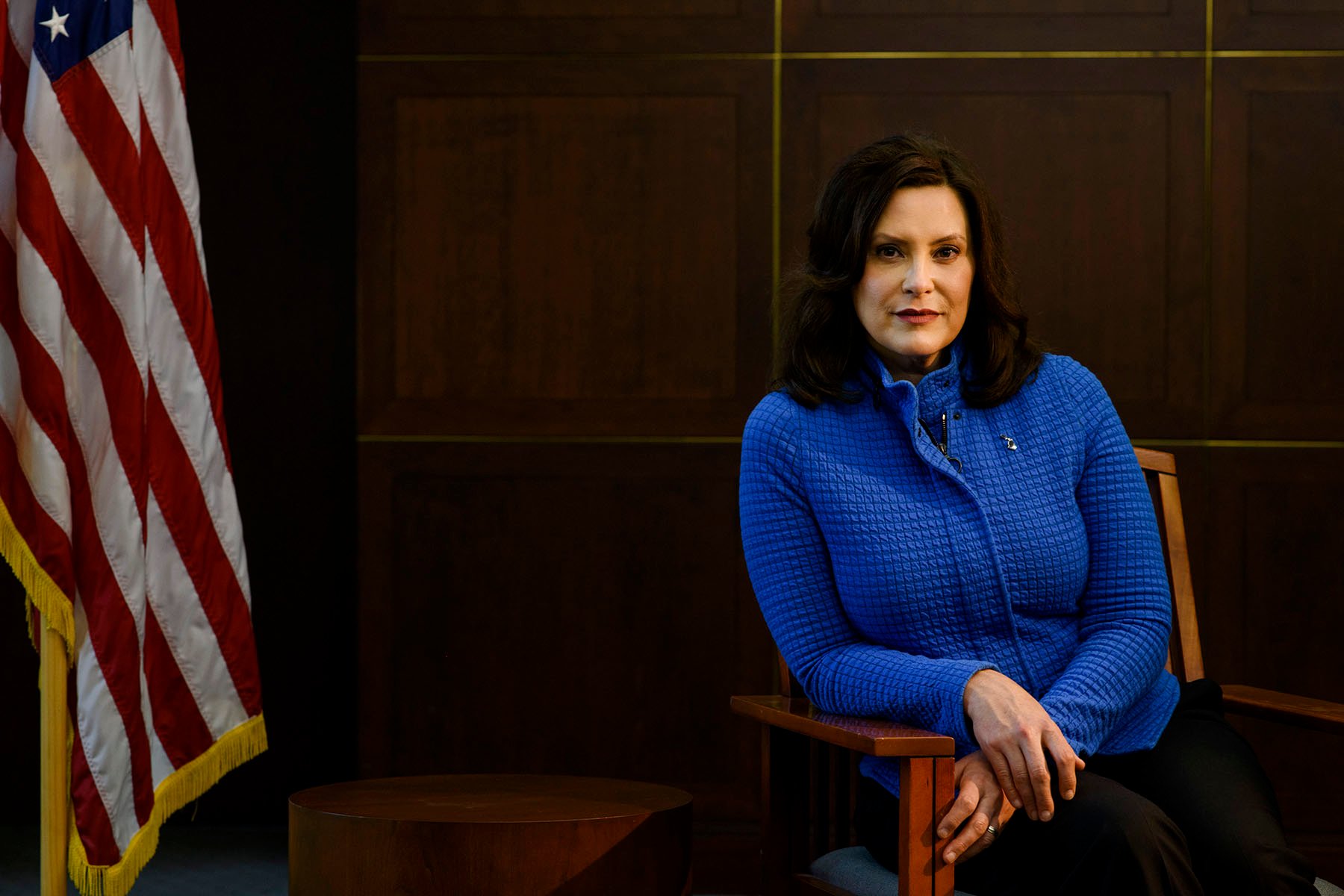With President Joe Biden dropping out of the 2024 presidential race and endorsing Vice President Kamala Harris to succeed him, one of the biggest questions is who Harris will pick as her running mate. And right now, lots of people are talking about Gov. Gretchen Whitmer.
The two-term governor of Michigan has been floated as a possible pick because of her leadership in a crucial Midwestern swing state, emphatic policy work to expand abortion access and collaboration with her fellow women governors nationally.
She has also come out on the other side of face-offs with Trump and the far right: Whitmer was the target of a white nationalist plot to kidnap and assassinate her during COVID-19 lockdowns. That came in the wake of a public dust-up with Trump after a confrontational call with the country’s governors about personal protective equipment distribution, when he referred to her as “that woman from Michigan” and some of the governors as “losers.”
And now Whitmer, who is term-limited as governor, has just taken one of the tell-tale steps of preparing for the national stage by releasing a book about her life and experiences. Published on July 9, “True Gretch: What I’ve Learned About Life, Leadership, and Everything in Between,” mixes playlists and recipes with the key pieces of advice that Whitmer says has shaped her political and personal outlook.
On Monday morning, her Fight Like Hell PAC endorsed Harris; in a news release from the PAC, Whitmer wrote, “I am fired up to endorse Kamala Harris for President of the United States. … She’s a former prosecutor, a champion for reproductive freedom, and I know that she’s got Michigan’s back.” Within hours, Whitmer had announced that not only was she endorsing Harris, but serving as a co-chair of her campaign.
-
The Amendment:
When asked by a reporter Monday if she would accept an offer to be Harris’ running mate should one be made, she replied, “No, I’m not planning to go anywhere. I’m not leaving Michigan. I’m proud to be the governor of Michigan.” That hasn’t stopped the conversation around her.
The 19th spoke to Whitmer about her book on Friday morning, before Biden had dropped out. She talked about the new generation of Democratic leaders inspiring her, the double standards faced by women in politics, how she has coped with trauma through public service and why the normalized state of political violence “scares the bejesus” out of her.
Interview has been lightly edited for length and clarity.
Jennifer Gerson: You start your book by talking about advice from your grandmother to look for the good in any situation. We’re in this moment of intense divisiveness, culturally and politically — what good do you see when you look out at the country right now? What potential do you see for politics to be a tool for looking for that good?
Gov. Gretchen Whitmer: My grandma Esther, who I called Nino, really made sure that was an important value instilled in all of us. It has helped me, even in times of crisis. In the book, I talk about how I talked to a counselor once who said every one of us is like a ball of clay and events happen that take pieces of that away, hollow us out at the time, but ultimately give us space for purpose. I think in these times of crisis, it often gives us the opportunity to see some of the best in people.
One of the parts of the national conversation that’s happening right now is that I don’t know for how many elections now that we’ve been electing Boomers. But now we have this moment to look at what might come next. There’s a generation of great Democratic leaders across the country and that’s really encouraging. That’s really hopeful. Looking from [Illinois Gov.] J.B. Pritzker to [Pennsylvania Gov.] Josh Shapiro to [New Mexico Gov.] Michelle Lujan Grisham to [former Rhode Island governor and now Commerce Secretary] Gina Raimondo to [California Gov.] Gavin Newsom to [Maryland Gov.] Wes Moore — there’s a national conversation happening on our side of the aisle about exciting things that we are on the cusp of.

You write about the way that things really crystallized for you when former President Donald Trump called you “that woman from Michigan.” What was the moment when you realized you were no longer already the governor of this critical swing state, but now evolving into a whole other thing in our public and political consciousness? How did you reckon with the weight and responsibility of that realization?
One of the things my dad said to a press person early on in my political career is, “Gretchen knows she’s not that special.”
Sometimes people read that and think, “Gosh that wasn’t very nice” but that wasn’t his intent in the slightest. He raised us to know that we’re not better, that no one is inherently better than another human being, that every person is important.
It is still strange to me when someone might recognize me outside of my own state. It’s a funny, odd experience. But I think that lesson of my dad is always in the back of my head. I think that seeing a person as a person, seeing the humanity in one another, is a throughline of my life.
-
Read Next:
In the book you tell the origin story of your campaign slogan, “Fix The Damn Roads” — it was something a mom whose child was in the hospital said to you while you were campaigning about what she needed most right now. It’s a really telling anecdote about listening. What are you hearing from folks in your state and beyond about what they really need right now?
When you say to someone, “What can I do to make your life better? What’s going on in your life?” — if you’re really interested in listening, people will be very candid with you. I think it’s really important to ask the question and know that people will tell you.
As I get across Michigan, what I’m regularly hearing is that people want us to continue to address the fundamentals, the stress of just being an American right now. People want to know that we’re doing everything we can to support their kids’ success and a path to opportunity. They want to know that their leaders actually care about them and are working every day to make their lives better. This means things like good-paying jobs and shoring up our supply chain so that God forbid we ever have to go through a global issue like we did with the pandemic, that we’re ready for it.
At the end of the day, every person wants government to be as good if not better than they are. They want their leaders to work as hard if not harder than they do and to stay focused on the things that really matter in their day-to-day lives.
You write in the book about the planned kidnapping and assassination plot against you. Political violence is once again back in the news cycle, unfortunately, and with it a discourse on the role of political rhetoric, gun regulation, the role of mental health and access to services. Given what you have been through, what do you think is being left out of the conversation now about the reality of political violence — especially the way it impacts women?
I think it’s a scary time, but it’s not just what’s happened in the last seven days. This has been a trajectory that we’ve been on and while I’m glad to see the speaker of the U.S. House using the same language that I’ve been using for years about turning down the temperature, I think it’s also important to hold one another accountable. This is a new message coming out of that side of the aisle.
Many people who have stoked the violence against me or against Nancy Pelosi and her family – we cannot forget that, and yet we also have to welcome them into the conversation that’s been long overdue. But there’s no question that violence against people with whom we disagree has become normalized in this country and the prevalence of guns is also something championed by the people that stoke the violence that are now talking a little but differently in moments, but haven’t changed anything about how their rhetoric and keeping it hot and calling their political opponents enemies — I mean, this all has a cumulative effect.
My biggest concern as a mom, as a leader, is that are we teaching our kids to think that this is normal? You look at anyone who is about 20 years old now — they were 10 when this all started to get normalized. They think this is all normal and that scares the bejesus out of me.
You talk about some of the double standards that you have experienced as a woman in politics, including the conversation around the way you experienced political violence — but at the same time, you write a lot about your drive to understand. What do you think is important to understand about the way women in our country are being talked about today?
I feel it every day, the responsibility of showing up and continuing to show strength in the face of uniquely challenging situations because of gender. Whether it is how I’m talked about with regard to my appearance or clothing, or whether it is the language that is used to describe a plot to assassinate me being minimized to a kidnapping plot — I feel it.
I don’t dwell, I continue to move forward and do the job that I’m hired to do and people expect and deserve that I do — but it’s heavy. I’m grateful that there are women who came before me that made it a little less heavy for me and I’m trying to do the same for my contemporaries and those who will follow me.
In the book you write about having been raped in college, you talk about the plot to assassinate you. You don’t shy away from being public with the fact that you have been through some traumatic things. In sharing about all of this, what do you hope people will see and what do you hope to model about how to continue after you’ve had an experience like this?
I have always found it was helpful to run toward the fire and stay engaged. Trust me, I have those moments where I want to check out, too. I want to turn off the TV or “leave” my phone behind accidentally and just go into my own personal space and have a moment to not be in it. But I find that when I do that, I feel worse.
By staying involved, that’s where you can get the energy and the optimism and the confidence. Just doing this work is better for my ability to have confidence that I’m actually in the majority in this country and that I’ve got to stay involved.
-
Read Next:
You end the book with a list of some of the issues that you believe are really worth fighting for: justice, dignity, reproductive autonomy. As you look ahead at this second half of your final term as governor, what do you still want to achieve in your state while holding this office and what comes next for you?
I don’t know what comes next. I know that I’ve got two and a half years to continue the work that I’ve gotten started. I’m very proud of some of the strides that we’ve been able to make as a state. I know the benefits of our incredible investments and policy work that we’ve done, about improving outcomes for our students that are probably not going to be felt while I’m still in office, and yet I know we’re on the trajectory and I want to make sure that can continue on.
As I think about these next two years, I want to really ingrain a lot of the work that we’ve done into our culture and into our statutes, so that it continues to result in better outcomes for kids, making Michigan a place where people are coming to for opportunity. That’s our legacy.









